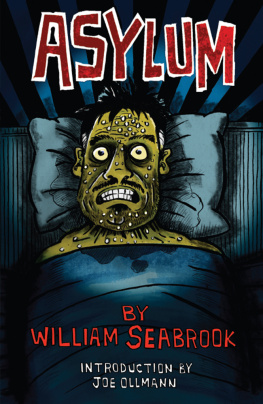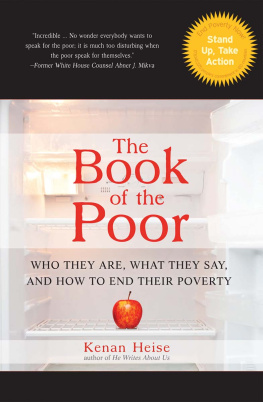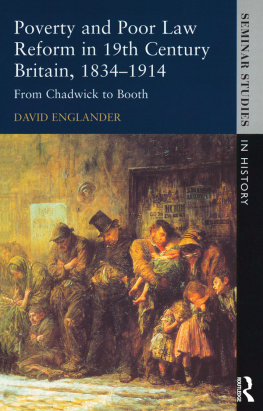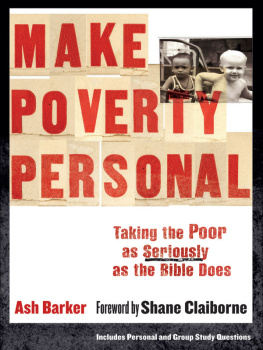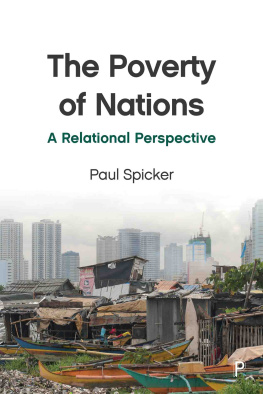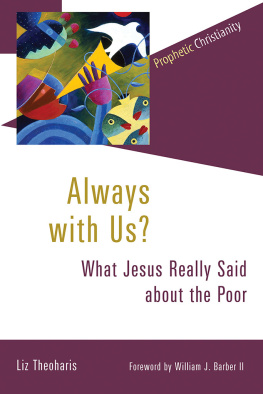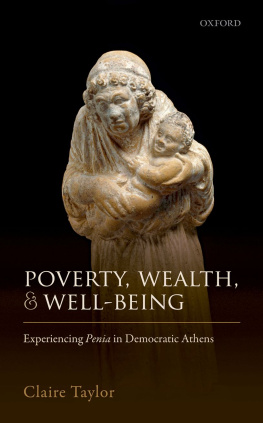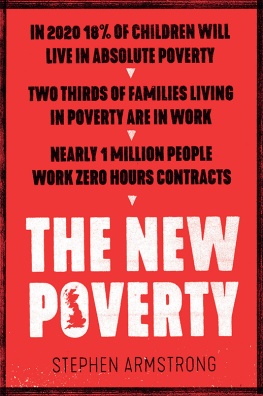PAUPERLAND
Pauperland
Poverty and the Poor in Britain
JEREMY SEABROOK

First published in the United Kingdom in 2013 by
C. Hurst & Co. (Publishers) Ltd.,
41 Great Russell Street, London, WC1B 3PL
Jeremy Seabrook, 2013
All rights reserved.
Printed in India
Distributed in the United States, Canada and Latin America by
Oxford University Press, 198 Madison Avenue, New York, NY 10016,
United States of America.
The right of Jeremy Seabrook to be identified as the author of this publication is asserted by her in accordance with the Copyright, Designs and Patents Act, 1988.
A Cataloguing-in-Publication data record for this book is available from the British Library.
ISBN: 978-1-84904-273-4
www.hurstpublishers.com
This book is printed on paper from registered sustainable and managed sources.
No part of this publication may be reproduced, stored in a retrieval system or transmitted, in any form or by any means, electronic, mechanical, photocopying, recording or otherwise, without the prior permission of the publisher.
CONTENTS
Although this book is the result of many years involvement with poor people, it has also been nourished by the work of many writers on the nature and development of poverty. Among those whose publications have been informative and stimulating, Sir Frederic Edens The State of the Poor, in 1797, has provided the most comprehensive history of the poor up to the middle of the eighteenth century; and it provided a framework for the history of poverty. Dorothy Marshalls The Poor in the Eighteenth Century is a rich store of insights into the late pre-industrial era, while the Report of the Poor Law Commission of 1834 must be one of the most profoundly ideological documents ever to have been produced by government. It embodied the tenets and values of political economy with an exuberance and enthusiasm that have had a long and vibrant afterlife. In the modern era, Gertrude Himmelfarbs The Idea of Poverty is a scholarly and sophisticated effort to demonstrate that capitalism is the sole remedy for all the ills it sought to address, as well as the multiple evils it created. Peter Townsends Poverty is an extraordinarily detailed account of what it meant to be poor in the second half of the twentieth century, but most significant of all is R. H. Tawneys Religion and the Rise of Capitalism, which chronicles the changing moral status of poverty and wealth.
I would like to acknowledge the help and suggestions of Kamini Adhikari, Barry Davis, Trevor Blackwell and, especially, Ivan Ruff. I have also gained much from Mukul Sharma, Charu Gupta, Bharat Dogra, Sugata Srinivasaraju, Rosy, and Dr Sanjeev Jain. I have been given some financial help by the Network for Social Change, and am grateful to Amanda Sebastyen. I would like to recognise the continuing support of the Institute of Race Relations, especially A. Sivanandan, Jenny Bourne and Hazel Walters.
Jeremy Seabrook
London, July 2013
This book reflects on poverty and poor people. It looks at constancy and change in how people experience want. It is not a history of poverty, nor is it part of an extensive academic literature on the poor. I have simply wondered how poverty has managed to survive both rigorous punishment of the poor and the accumulation of the most spectacular riches the world has ever seen. It consists of a series of questions, to which any answers I suggest are only tentative and provisional. How did sufficiency cease to represent enough? Why have distinctions between the bashful poor and the aggressive poor, the respectable and the rough, been so difficult to sustain? Why did the proportion of poor people increase with the growing wealth of Britain? Is the desire for more really an expression of human nature, or does it tell us more about the nature of capitalism? How did poverty cease to be a natural condition and become a cause for shame? And when did wealth stop being a temptation to which it was foolish to succumb? What is the fate of limitless accumulation in a finite world?
Far from the least of these questions is where do the attitudes which animate popular resentment of the poor come from? The utterances of contemporary politicians, commentators and observers are never without precedent. The remedies and policies advocated by todays government, think-tanks and policy reviews have all been rehearsed for centuries. It is a rarely remarked upon irony that, given the waste and extravagance of the contemporary world, the one thing that is perpetually recycled is our own history, nowhere more so than in the repetition of ancient strictures upon the poor. Ideas that are flourished as novelty by conservatives and radicals alike are usually found to have been slumbering within a torpid consciousness which cannot wait to forget the past, in order to rediscover it and propose its failed responses as the latest expedient for dealing with poverty. For this reason, a good proportion of this book is devoted to historical precedents, legislation and attitudes which illuminate, not so much how far we have come in the increase of wealthfor that is indisputablebut how short a road we have travelled in our reactions to the poor and excluded.
The history of the poor is a history of attitudes towards the poor, since the voices of poor people have generally gone unheard. What can be seen, dimly, in the clouded mirror of legislation affecting the poor, is the responses of those in power which mutated considerably according to the degree of menace they posed to the ruling classes, or the level of charity which these same ruling classes adopted towards them. Even when the poor do express themselves, what they say is almost always interpreted or re-interpreted, not only by their enemies, but also by their friendsthe latter usually have some ideological axe to grind, and they enlist the poor for purposes other than their improvement: this is as true of the mob which clamoured for King and Country in the eighteenth century, as it was of an impoverished working class, called by its Marxist mentors to carry out an historic destiny of changing the world.
The English language is particularly rich in terms for poverty; the word itself conceals a multitude of meanings, and does not distinguish the diversity of ways in which it is possible to be poor. Poverty covers the destitution of refugees and victims of natural catastrophes; it is used to describe the condition of marginal farmers, the evictees of development, slum living in the settlements of Dhaka or Kinshasa, the privations of ravaged housing schemes in rich societies; but also the elective frugality of certain religious orders and the restraint of people trying to resist over-consumption. The synonyms for poverty, however, tell the story of how it has changed over time, which is the subject of this book. Want and need (in the singular, because in the plural they have quite different connotations) suggest an absence of basic sustenance, people on the edge of survival. The words evoke ruined harvests, lean seasons and grudging earth; a penury that has been the fate of most peoples through recorded time. To this, misery adds, perhaps, a psychological dimension: it suggests the unhappiness that comes from knowing that this state is not inevitable.
This early idea of poverty has pervaded all its successors. Even when the threat to life has been lifted from societies that can ensure sufficiency, memories of great hungers and migrations haunt the imagination; a menace that still hovers over landless people, indigenous populations and those whose ancestral lands have been degraded, or confiscated for mining and infrastructural development.
Next page

